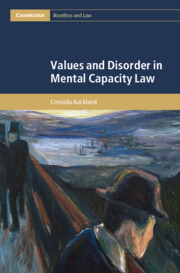Book contents
- Values and Disorder in Mental Capacity Law
- Cambridge Bioethics and Law
- Values and Disorder in Mental Capacity Law
- Copyright page
- Dedication
- Contents
- Acknowledgements
- Cases
- Statutes
- Introduction
- 1 A Value-Neutral Understanding of Capacity
- 2 An Essential Role for Values in Assessments of Capacity
- 3 Why Disorder Matters
- 4 Accommodating Values in the Test of Capacity
- 5 Reflecting Ambiguity on the Cusp of Capacity
- 6 Softening the Capacity Cliff Edge
- Conclusion
- Appendices
- Book part
- Bibliography
- Index
- Cambridge Bioethics and Law
Conclusion
Published online by Cambridge University Press: 25 October 2024
- Values and Disorder in Mental Capacity Law
- Cambridge Bioethics and Law
- Values and Disorder in Mental Capacity Law
- Copyright page
- Dedication
- Contents
- Acknowledgements
- Cases
- Statutes
- Introduction
- 1 A Value-Neutral Understanding of Capacity
- 2 An Essential Role for Values in Assessments of Capacity
- 3 Why Disorder Matters
- 4 Accommodating Values in the Test of Capacity
- 5 Reflecting Ambiguity on the Cusp of Capacity
- 6 Softening the Capacity Cliff Edge
- Conclusion
- Appendices
- Book part
- Bibliography
- Index
- Cambridge Bioethics and Law
Summary
This book explores the role that values and value judgements play in assessments of capacity. In doing so, it has attempted to grapple with a fundamental tension that lies at the heart of our capacity legislation. On the one hand, the liberal intuitions that underpin the test for capacity suggest that people ought to be free to make decisions according to their own values and beliefs, no matter how unusual or eccentric these may be. On the other, there are certain beliefs or ways of valuing that we intuitively regard as so abnormal, and so harmful, that we think that far from facilitating decisions based on them, people ought instead to be protected from them. We characterise these beliefs, values, or behaviours as ‘disordered’, yet as the foregoing analysis has shown, the line between the disordered and the eccentric is far from clear cut, being both socially and culturally contingent, and reliant on complex clinical judgements, rather than a matter of objective medical fact.
- Type
- Chapter
- Information
- Values and Disorder in Mental Capacity Law , pp. 273 - 282Publisher: Cambridge University PressPrint publication year: 2024

